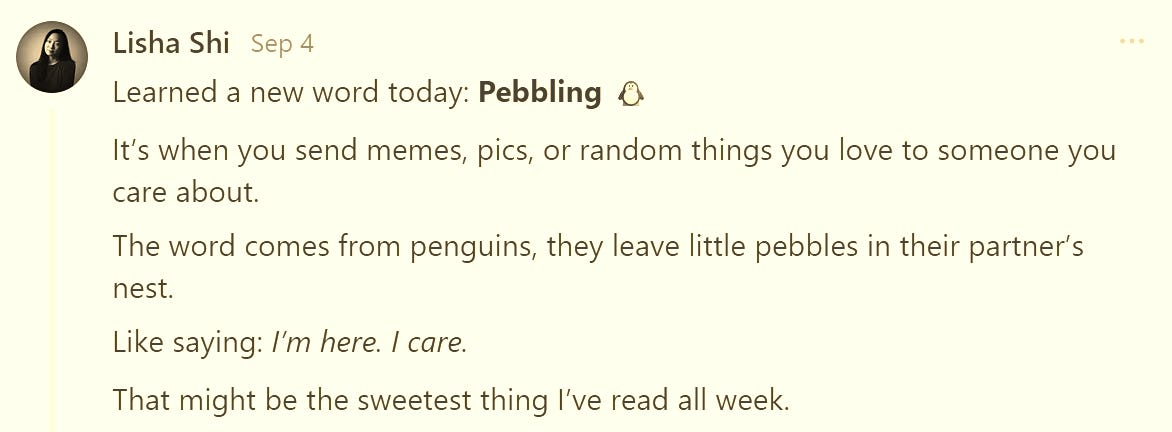Pebbling: How sharing memes can get us in touch with our inner penguin
Jokes as relationship maintenance
When a penguin visits another nest, but finds its occupant gone, it leaves a pebble as a “sorry I missed you” message. In many ways, we do the same.
Do you recognize yourself in any of these habits? When you see a funny video or meme, you send it to a well-defined and small group of people. Some jokes go to your partner. A different type of joke goes to your closest friend. You send different kinds of memes to people depending on their age and gender. You then check whether they have seen and liked what you shared.
I do it. I send jokes, health advice, and political observations to my wife. I have two close friends that I share funny videos with that would get me in trouble with many other people. I share jokes about raising young men with a friend who has a son the same age as mine. All I expect in return is the occasional emoji: usually the laughing-out-loud face. Occasionally, a thumbs-up. Sometimes, only the “wow” emoji is appropriate. In return, I respond to the memes or cat videos they send me in the same way. There is one person I almost exclusively share Star Wars memes with—occasionally a Star Trek meme, because we know each other so well that pretending I don’t know the difference between the two universes is a subtle joke in and of itself.
Media and guilt
Until a few days ago, I would not have shared these stories. Both our mobile phones and permanent interconnectivity (social media and now AI-generated videos) are so new that we often don’t know what to make of them. Mostly, the meme-sharing behavior makes us worried. Should we? Can we? Is it childish? Indecent, even? There is a reason we only send it to the few people we know well enough to feel safe doing it. We’d worry too much about what others would think of it.
But then I saw a Substack Note by Lisha Shi, who wrote: “Learned a new word today: Pebbling 🐧 It’s when you send memes, pics, or random things you love to someone you care about. The word comes from penguins, they leave little pebbles in their partner’s nest. Like saying: I’m here. I care.” And she added: “That might be the sweetest thing I’ve read all week.”
It made me think. Could she (and her source) be onto something, or am I rationalizing my own behavior to resolve cognitive dissonance? In other words, do I like this quote because it makes me feel better about behavior I worry about? After thinking about it, I realize that many communication theories support a positive interpretation of “pebbling.”
We often feel guilty about our media use, but just as often is the digital version of something very human
Do you want to know how I’m doing, or are you just being phatic?
We already engage in many similar behaviors in our day-to-day, face-to-face lives. One of the things I had to learn when I first moved to the US was that the ubiquitous “How are you?” does not require a full inventory of my personal life. “Good” or “Alright” is all that’s expected. And many people will even “answer” with “How are you!” You might think that is weird behavior, but it is not. As early as 1923, anthropologist Bronislaw Malinowski called this “phatic” behavior. The question “How are you?” isn’t a request for information or self-disclosure; it is a way to maintain relationships. It signals “I have seen you, and I acknowledge you as someone I am willing to interact with.”
In the offline world we use phatic behavior to show “the line is still open”
Backchannel behavior
We have many ways to signal that we are present for each other. I have to warn guest speakers when I invite someone to talk to my students that some typical phatic behaviors will be absent. In a regular audience (or even a conversation between two people), there will be lots of nodding or “uh-huh,” not to signal agreement, but to show that the channel is still open: the relationship is ongoing, and the other person remains available as a conversation partner. This is known as backchannel behavior, a key element in maintaining a conversation (and a relationship). Students, however, soon learn that the instructor will keep on talking whether they encourage that or not, and they develop a very different style. I tell my guests that as long as the students sit quietly, staring as if their eyes have glazed over, they are actually paying attention. We are so accustomed to phatic behaviors that being confronted with a student audience can be very unsettling: our subconscious notices the audience stopped responding, even if our conscious mind, focused on our presentation, has no clue why we get a sinking feeling in the pit of our stomach.
Why the shared memes are meaningless
If you wondered why leaving a pebble in a penguin’s nest is the same as sending a superficial meme, it is because the act is more important than what you leave or send. You are telling the other person: “I was thinking of you,” or “I cared enough to reach out to you.” No wonder it seems to happen a lot between romantic partners: even though your spouse may be sitting in the next room, sharing a quick giggle feels good. Even if they roll their eyes at your puerile jokes (and I will have you note that nothing in my personal life led me to this conclusion), it still says, “I don’t worry about being silly in your eyes because I trust you.”
Bizarre? Not really. There is plenty of research showing that small acknowledgments, affectionate messages, and “micro-affirmations” happen offline too. “It looks like it is going to be cold today” is less about weather forecasting and more about checking in. That’s why a simple emoji or a like in reply to your meme can warm your heart. You won’t remember it five minutes from now, but neither would you remember a routine smile at the breakfast table.
The content matters less than the signal: I thought of you
Why the shared memes are meaningful
I have a very small group of very close friends with whom I regularly exchange online jokes and memes. They live all over the world, so relationship maintenance is clearly a part of it. But I also tailor what I send to each person. Not just any message feels suitable. Do you share jokes or memes with people you don’t know well? Most of us don’t; we’d worry about what they might think of us.
When you send a risqué joke to a close friend, you do more than share a joke. You acknowledge trust and a shared culture. Shared laughter indicates a stronger bond. You show that you know the boundaries the outside world draws, but you are close enough not to care in the presence of the other person. If you read about this in the academic literature, it often sounds as if this sort of stuff is tongue-in-cheek: “I’m sending you this joke because we both know it is wrong, and our response is both to cringe and to feel closer for having shared this.”But that’s the playful version. People don’t always admit their deepest fantasies, desires, or behaviors to a stranger, especially a researcher. They are more likely to catch on to “Look at me, buddy, for pretending!” content than actual unpleasantness. Now and again, a celebrity or a politician will get in trouble for accidentally saying the quiet part loud. If private messages are leaked that are not just risqué but clearly offensive, it is because they shared the thought with a person they trusted, not “even though” it was offensive, but “because” it was offensive. They assumed it was safe to show their real thoughts in a private channel.
Is this healthy, or not?
I’d say that it isn’t weird behavior. It is the online version of things we do in face-to-face relationships. Your jokes may be “cringe,” or they may be offensive to other people, but if that is who you are, so would your jokes be if you were sharing them with the same person in the privacy of their house. The fact that it happens online isn’t what makes them cringeworthy or offensive.
There are many ways in which “pebbling” could be an indicator of something unhealthy. If you misjudge the quality of a relationship, and the other person doesn’t feel as close to you as you do to them, your pebbles may be seriously out of place. Or you might be leaving pebbles incessantly and then monitor the reaction and response time as a way to exert obsessive control over someone. Digital communication has lowered the threshold for engaging in stalking, surveillance, and harassment to such an extent that it is something to be aware of.
What pebbling can teach you about your relationships
How does pebbling make you feel? Perhaps it can tell you something about unbalanced relationships: you may be sending or receiving more or less than you’d like. Don’t ignore that signal. If you smile at someone at work and you get stonewalled, that tells you something; so does an unanswered meme.
Do you send different jokes to different people? That tells you something about those relationships.
In sum: learn to pay attention to your inner penguin. It will show you everyday warmth, or it may warn you when you are on thin ice!




This is sooo good.